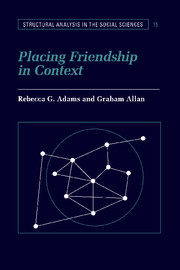Book contents
- Frontmatter
- Contents
- Notes on the contributors
- Acknowledgements
- 1 Contextualising friendship
- 2 The modernisation of friendship: individualism, intimacy, and gender in the nineteenth century
- 3 The gendered contexts of inclusive intimacy: the Hawthorne women at work and home
- 4 Friendship and the private sphere
- 5 Rich friendships, affluent friends: middle-class practices of friendship
- 6 Women's friendships in a post-modern world
- 7 Foci of activity as changing contexts for friendship
- 8 The demise of territorial determinism: online friendships
- 9 Reflections on context
- Index
- Structural Analysis in the Social Sciences
5 - Rich friendships, affluent friends: middle-class practices of friendship
Published online by Cambridge University Press: 15 December 2009
- Frontmatter
- Contents
- Notes on the contributors
- Acknowledgements
- 1 Contextualising friendship
- 2 The modernisation of friendship: individualism, intimacy, and gender in the nineteenth century
- 3 The gendered contexts of inclusive intimacy: the Hawthorne women at work and home
- 4 Friendship and the private sphere
- 5 Rich friendships, affluent friends: middle-class practices of friendship
- 6 Women's friendships in a post-modern world
- 7 Foci of activity as changing contexts for friendship
- 8 The demise of territorial determinism: online friendships
- 9 Reflections on context
- Index
- Structural Analysis in the Social Sciences
Summary
Introduction
It has been argued that married women face a number of structural and cultural barriers to the construction of personal relationships outside the domestic sphere, for typically they have much less time, personal space, and access to financial resources than do their husbands (Pahl, 1984; Allan, 1989). It has also been suggested that married women are reluctant to encroach on their quality family time with children and husbands (that is, in the evenings and over weekends) as this in turn inevitably confines both the range of activities wives can participate in, and the number of interactions they could ‘conveniently’ have (Green, et al., 1990; O'Connor, 1992). This chapter, however, comes to a rather different conclusion. It will be argued below that, while there are a number of effective barriers to the construction, development, and maintenance of close female relationships, these constraints are not always as rigid or as forceful as they might first appear, especially for the particular people at the heart of this study – married, middle-class women.
By focusing on a specific socio-economic group, one of the central themes of this book – that different structural features influence personal ties and organise informal relationships – can be made explicit here.
- Type
- Chapter
- Information
- Placing Friendship in Context , pp. 92 - 116Publisher: Cambridge University PressPrint publication year: 1999
- 1
- Cited by



